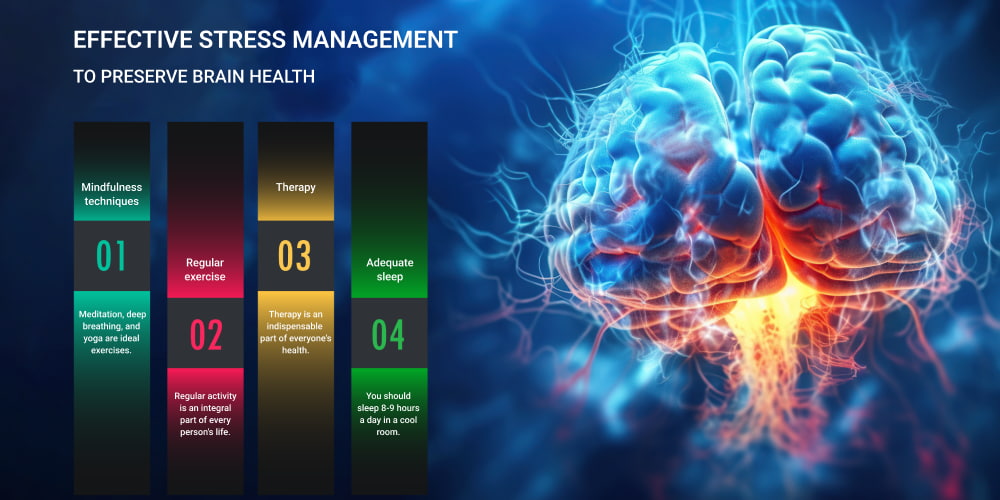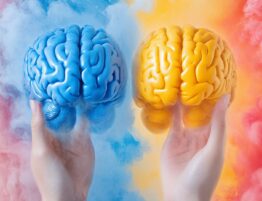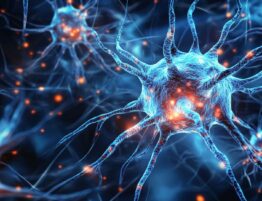Chronic stress can significantly impact an individual’s health. Stress is a factor that causes aging of both body and brain. It creates ongoing physiological stress and leads to brain damage. Chronic stress is a permanent condition that affects the body over the long term. It reduces productivity and reduces their cognitive abilities. It accelerates aging and increases the release of cortisol. Cortisol is the primary stress hormone that exacerbates brain aging. During long-term stress, the body releases cortisol in large quantities. Acute situations have a long-term effect on the body.
As a result, a person suffers from disorders of the brain and its primary functions. The brain has an inflammatory reaction and a decrease in cognitive abilities. Constant stress affects not only the brain but also the mood and leads to depression. During this process, memory suffers and deteriorates. Stress has an interdependent effect on the brain. It increases oxidation, which increases the risk of neurodegenerative diseases. To avoid rapid brain aging, diet, physical activity, and a positive mental outlook is essential. These factors contribute to overall health and wellbeing.
How Chronic Stress Accelerates Brain Aging
LoneStarNeurology offers high-quality treatment of neurodegenerative diseases. Our specialists provide comprehensive care focused on your neurological health. One of the serious problems today is long-term stress. It is the leading cause of premature brain aging and impaired brain function. Key brain regions are affected by the constant release of stress hormones. Structural changes occur that accelerate the decline in cognitive abilities. A person is also at risk of developing a neurodegenerative disease. Here is the main effect of cortisol and its impact on the brain structure:
- Shrinking the hippocampus. Chronic stress accelerates neuronal damage and loss. The hippocampus plays a significant role in memory formation and emotional regulation. Chronic exposure to cortisol leads to disorders such as reduced neurogenesis. A person becomes more susceptible to neurodegenerative diseases such as Alzheimer’s disease.
- Disorders of the prefrontal cortex. The prefrontal cortex controls the process of attention and decision-making and regulates impulses. Constant stress impairs this function and leads to many problems. It increases emotions, which later become a depressive state. Stress on a regular basis leads to cognitive decline.
Chronic stress damages specific brain structures and cellular aging. During this process, aging occurs at the cellular level, and oxidative stress increases. The process leads to inflammation and damage to essential neurons. Another disadvantage is the reduction of brain plasticity and permanent damage.
The Role of Neuroplasticity in Brain Aging
Neuroplasticity plays an essential role in the brain’s ability to reorganize itself. The brain can form new neural connections throughout a person’s life. As a result, a person can learn well, have a good memory, and recover from brain injuries. This process helps to prolong the aging process and maintain cognitive abilities. This is how brain health is maintained:
- Neuroplasticity helps to form new neurons and constantly generates them.
- It enables neurons to form and strengthen connections.
- It allows other parts of the brain to take over functions and reduce the impact on cognitive health.
Reducing this process accelerates chronic stress and causes problems for recovery from injuries. A person is at increased risk for Alzheimer’s disease and other types of dementia. Equally important are the significant challenges in learning new skills and the ability to perceive information. To counteract these damages, it is essential to maintain your health. Here are some interesting tips:
- Learning should be lifelong to improve cognitive abilities. Stimulating the brain with new hobbies or activities is essential. You can read, do crossword puzzles, and engage in mentally stimulating activities.
- Stress management is another key to staying healthy. Practice meditation, mindfulness, and deep breathing. These practices can help maintain overall health.
- Don’t forget to exercise, both aerobics and strength training. They improve neurogenesis and help keep you healthy.
- Quality sleep and a healthy diet play a key role in brain health. They help preserve memory and avoid stress.
The Link Between Chronic Stress and Cognitive Decline
We provide help to patients seeking treatment. We are committed to providing ongoing care for our patients for their health. Chronic stress has a profound impact on a person’s cognitive abilities. The brain is experiencing chronic stress and undergoes structural chemical changes. As a result, a person experiences memory problems, difficulty concentrating, and reduced data processing. Excess cortisol has a significant impact on stress. When it is very high, the hippocampus shrinks. Neurons that affect memory loss are damaged. Constant stress has a great impact on the prefrontal cortex, which is responsible for decision-making. A person experiences emotional difficulties and becomes overly active and anxious. Here are the main characteristics of cognitive problems associated with chronic stress:
- Memory problems. Long-term stress causes a deterioration in memorizing information. A person becomes forgetful and has trouble remembering things.
- Difficulties with concentration. During long-term exposure, a person can’t concentrate on a particular task, experiencing frequent distractions and difficulties with multitasking.
- Slower processing speeds. Constant stress makes it difficult to analyze any problem quickly. A person can’t analyze everyday information and react quickly to stimuli and responses.
These problems accelerate brain aging and increase the risk of neurodegenerative diseases. Constant stress accelerates the risk of Alzheimer’s disease and dementia. Mild cognitive impairment may progress to dementia. During continuous stress, the human brain shrinks and reduces its cognitive stability.
Effective Stress Management to Preserve Brain Health
There are several evidence-based practices that improve brain health and neuroplasticity. Managing constant stress plays a vital role in maintaining brain health. Supporting this process will allow you to adapt and form new connections. Stress reduction strategies are ideal for people who care about their health. Here are its main characteristics:
- Mindfulness techniques. Meditation, deep breathing, and yoga are effective practices. They help you relax and promote mindful self-awareness. They reduce the level of cortisol, the primary stress hormone in the body. Thanks to these practices, it is possible to avoid cognitive decline and restore emotional regulation.
- Regular exercise. Regular activity is an integral part of every person’s life. Aerobics, strength training, and stretching play an important role. They improve blood circulation to the brain, which supplies all the nutrients. Exercise keeps the body healthy and helps maintain memory.
- Therapy. Therapy is an indispensable part of everyone’s health. Cognitive behavioral therapy can help manage stress and reduce its impact on the body. Therapeutic intervention can improve your health and cognitive functions. The healthcare provider will evaluate your condition and prescribe therapy for you as soon as possible. Improve your memory and reduce stress and anxiety. It plays a key role in your brain health and self-esteem.
- Adequate sleep. High-quality sleep is an integral part of good stress management. You should sleep 8-9 hours a day in a cool room. Sleep helps to remove toxins from the brain and improves memory. It is key to maintaining cognitive ability and emotional well-being.
The Science of Stress and Cognitive Resilience
Chronic stress affects and damages brain structures. The brain adapts to stress through cognitive resilience. It can recover and respond to various stressors. Stress affects the hippocampus, which is responsible for memory, and the prefrontal cortex, which is involved in decision-making and helps people think.
- The brain can adapt and form new neural pathways neuroplasticity, which is its advantage. New neural connections are formed that are directly related to stress. People who practice specific tasks and problem-solving strategies have improved neural resilience. They are more resistant to stress and cognitive decline.
- Developing effective coping mechanisms requires exposure to manageable levels of stress. Meditation, exercise, and yoga are key to health. They help release dopamine and serotonin, which protect the brain from disease. They help prevent cognitive decline and help protect against cognitive decline.
- People who choose healthy lifestyles and effective emotional regulation strategies are individuals who effectively manage stress and keep their brains healthy. This helps maintain both overall health and brain function. Cognitive function and mental well-being can be maintained.
Why Stress Management Is Key to Healthy Brain Aging
Managing stress is crucial for healthy brain aging. Stress management helps maintain brain health and cognitive function. Constant stress increases cortisol levels and damages brain structure. Long-term exposure accelerates the aging process and reduces cognitive abilities. Chronic stress may increase the risk of neurodegenerative diseases.
- Long-term stress management strategies are key to slowing down aging. A healthy stress response can help slow brain aging. The brain maintains its ability to form new neural connections and function effectively. Maintaining a balanced, nutrient-rich diet is beneficial for the body. Meditation, physical activity, and quality sleep play a key role.
Stress management improves mental well-being and brain function. Individuals can maintain their memory and concentration throughout their lives. The emotional state can be maintained throughout one’s lifespan. Brain health directly depends on a person’s stress level and well-being. Therapy and treatment are essential for a higher quality of life and cognitive abilities. Managing stress through treatment and lifestyle changes can improve overall health.












Please, leave your review
Write a comment: